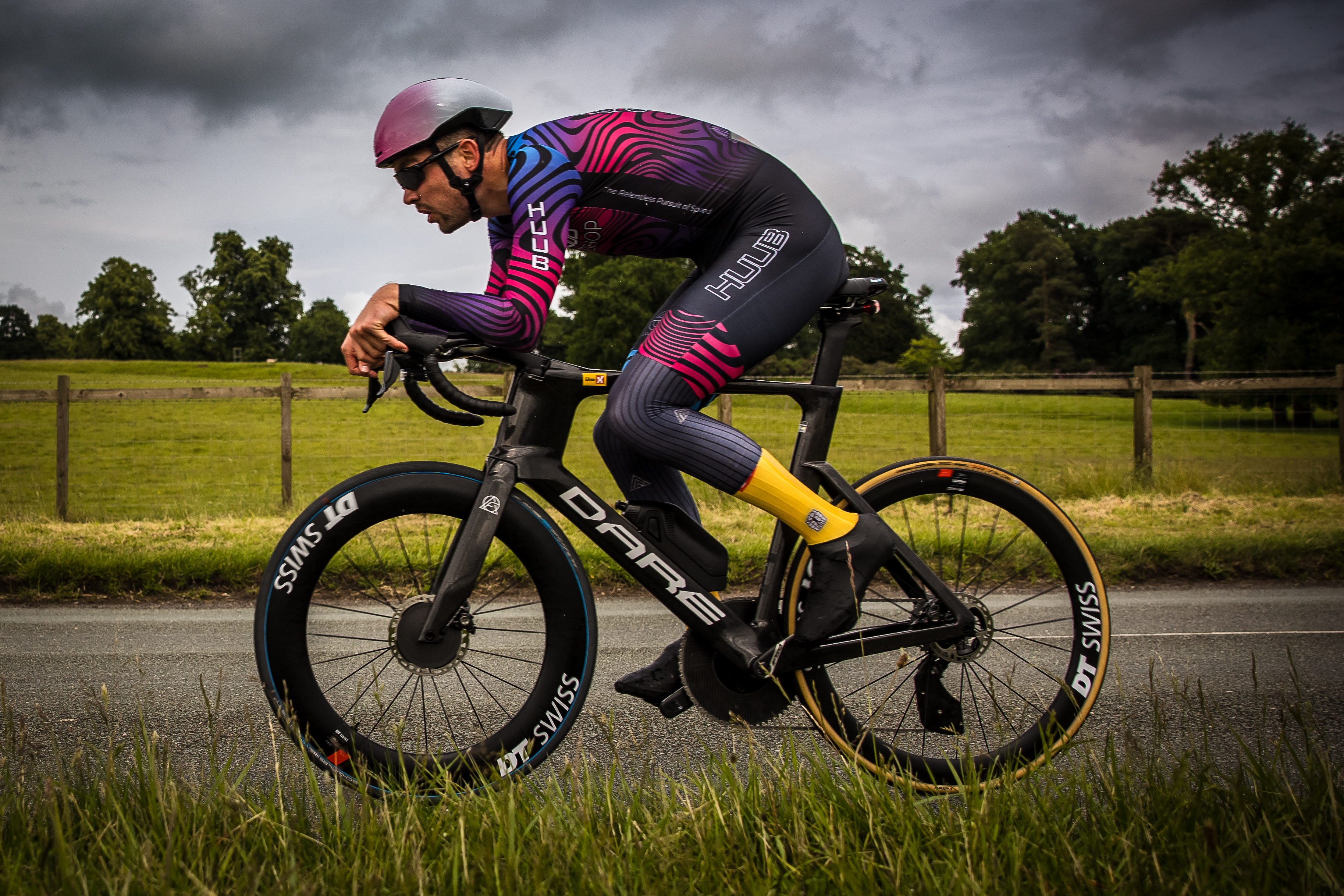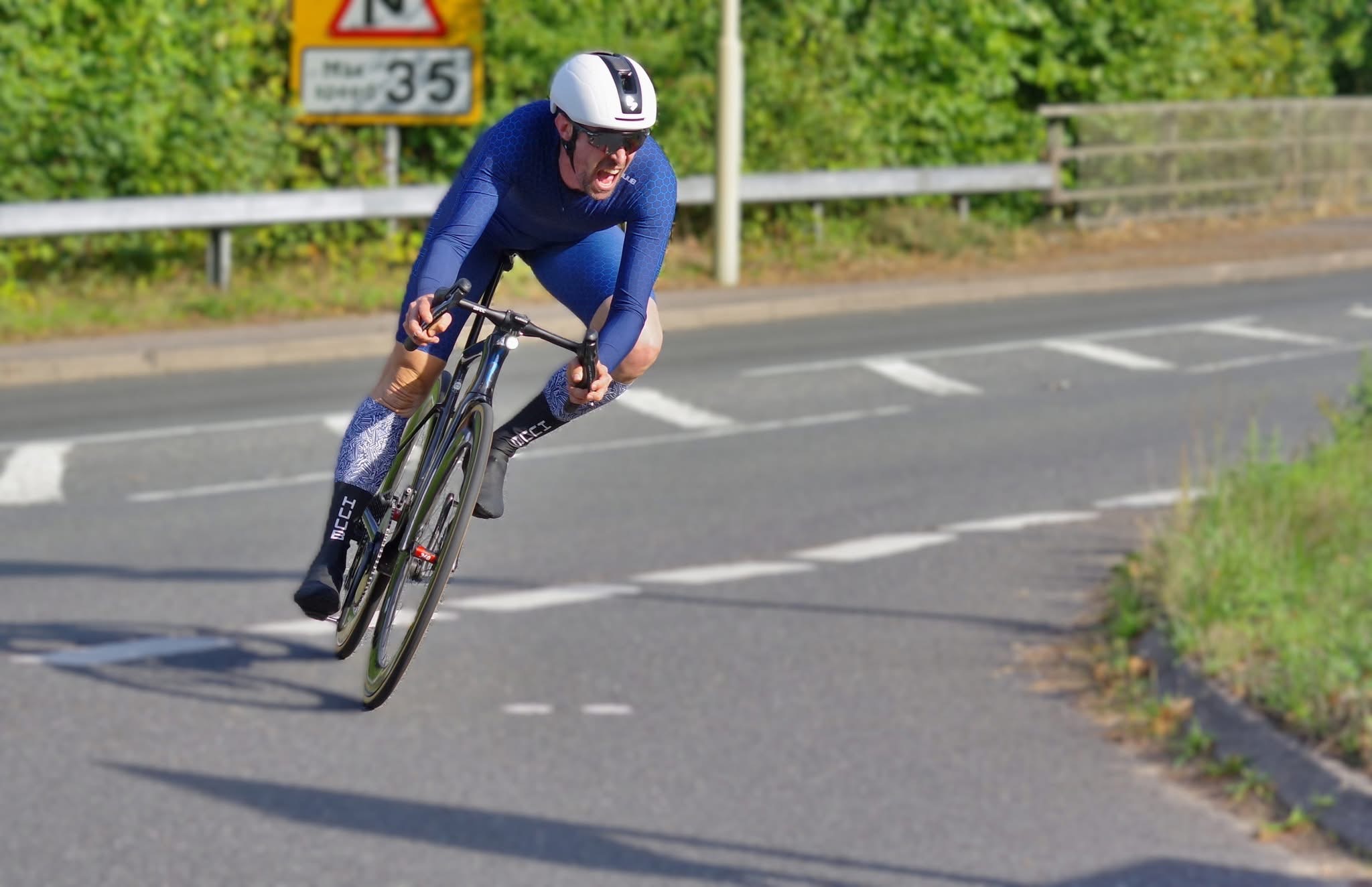'I thought, this is going to be close': How two riders broke a 47-year-old time trial record almost simultaneously – 150 miles apart
Another success story for road bike time trials in the UK as Alf Engers's 1978 25-mile mark is soundly beaten


The latest race content, interviews, features, reviews and expert buying guides, direct to your inbox!
You are now subscribed
Your newsletter sign-up was successful
The weather in South Wales last weekend was not entirely clement. Nothing entirely unusual there you might think, but at the Port Talbot Wheelers 25-mile time trial at Glynneath there was a lot at stake.
Time triallist Casper Folsach had enjoyed decent conditions for the majority of his race, but the weather suddenly turned as he neared the finish. Having battered his way through five final blustery miles of stormy headwind, losing time all the way, he checked his time as he rolled over the line, spent.
Despite the weather, he was not entirely surprised to see that he had smashed a 47-year-old record, set by one of the grandees of time trialling back in 1978 – a ride which, to this day, remains one of the most celebrated accomplishments in the sport.
Alf Engers became the first rider to beat 50 minutes – equal to 30mph average – for 25 miles when he set a record of 49:24 in Essex that year. At the time it was a British competition record and while it has since been bettered, no one has ever done so on a standard road bike. Until now. Folsach, a retired pro with an Olympic team pursuit bronze from Rio 2016, had gone 1:45 quicker with a stunning 47:39.
The only thing is, it wasn't technically Engers's record that Folsach had beaten. For the past few minutes, the road bike '25' record had belonged to Paul Burton, a 44-year-old company director based in South East England, who had beaten Engers's record by three seconds in an event 150 miles away in Hampshire.

Paul Burton on his way to breaking Engers's record
Like Folsach, Burton, who rides for Paceline RT, had set off on Sunday morning with the very explicit idea of breaking the Engers record in mind. On a good day, he reckoned, he was in with a shout of doing a long '48' in the Paceline RT Autumn 25 event, held on the P881/25 course on the A3, and which he himself had organised.
But Burton was also well aware that Folsach, of Huub-Wattshop, would be riding, and that as a former pro rider with an Olympic medal in the cabinet at home, the Dane was very likely to better his time by a couple of minutes on what was an even faster course.
The latest race content, interviews, features, reviews and expert buying guides, direct to your inbox!
By the time he'd got back to the HQ the news was out that his new record had been broken, as expected, by Folsach.
"He's the top-ranked road bike time triallist in the country, and he was entered onto the fast Wales course," Burton points out to Cycling Weekly. "I thought, he's going to do a '47', so my only chance is my event that, as it happens, was an hour earlier than theirs. I thought, right, I've got one shot.
"It was really slow going in the first half of the race, so I thought, 'Crikey, this is going to be close'," adds Burton. "But in the end I just nipped under it by three seconds, which is super fun, and I knew Casper was going to break it. And then by the time I got to the headquarters, I saw on Strava that he had indeed done the '47', but I'd nipped in there five minutes earlier and got there first. So that was job done."
The "fast Wales course" that Folsach was riding, is the newly resurrected R25/3H on the A465 at Glynneath. Out of action for four years due to roadworks and redevelopment, this famous time trialling course has come back online only this summer, and it's already making headlines.
Much is made of the 'gift hill' near the start – down which Folsach tells Cycling Weekly he saw more than 80kph – and which competitors do not have to climb back up at the end.
This was the first time that Folsach had ridden it and, he says, the course is fast enough as a whole that even without the downhill at the start, he calculated he would have comfortably beat Engers's time.
And when Folsach talks about his calculations, you can bet he's not going to be far out – his job these days is as performance coach and aerodynamicist for WorldTour team Uno-X Mobility, after all.
"I could see from my modelling prior to the event that as long as everything went to plan, I should be able to beat [the Engers time]," the 32-year-old tells Cycling Weekly. "With my usual power and CdA and everything else, I should be close to the time I did actually."
Both Burton and Folsach were riding what could be termed 'standard' road bikes, in that their frames were designed for road riding and the rest of the componentry fell within CTT guidelines. They may be somewhat different to the machine used by Engers back in 1978, but there is no room here for a reprise of the complaints that dogged last year's Road Bike National Championship time trial, it would seem.
Burton, for example, was riding a six-year-old Specialized Venge frame, which he had kitted out with some carefully selected components, such as deep-section Enve 7.8 wheels, Avec Aer 32cm bars and a 58-tooth chainring.
"It’s highly optimised, but this is still a proper road bike that I road race on and, you know, it's not even a brand new spanking one," Burton says. "So that's a nice thing, I think."
Folsach's machine, with its WorldTour pedigree, was another level up: he used one of the Dare VA-AFO aero road bikes, as used by Uno-X in the Tour de France last year. Added to that was an 80mm DT Swiss front wheel borrowed from his fellow Olympic medallist spouse Elinor Barker, and his own 50mm DT Swiss wheel at the back.
Sprinkled into the mix was a Shimano Dura-Ace based groupset, with Wattshop Cratus cranks adjusted to an entirely unfamiliar 160mm, and a 64-tooth single ring.
While a near-two-minute beating of a short-distance time trial record would usually be an 'on the shelf' moment, Folsach says he was "bleeding time" over the windy final five miles, suggesting there could be more to come on a better day. For his part, Burton reckons that even Folsach's team is eminently beatable if the fastest riders start taking road bike time trialling seriously.
"I think the conditions in Wales were maybe 30 seconds slower than the month before. So, yeah, why not?" he says. "If you look at the top-ranked time triallists, you're looking for those that also road race, the likes of John Archibald, Dan Bigham, Leon Atkins, Dylan Sage, Jamie Whitcher… they'll have nice road bikes, and they know how to ride aero.
"There's no reason why someone couldn't do a 45- or a 46-minute TT on a road bike on the right day," Burton adds. "Or, you could see people go under 18 minutes for 10 miles. These things are possible, and records are made to be broken, and it'd be great."
This brace of new records is another pin in the map for Cycling Time Trials's road bike strategy, designed to make time trialling more accessible and offer a much-needed boost to race entries.
The latest figures from CTT suggest it has successfully tapped into a latent 'market', with road bike time trial participation in UK open time trials having tripled since 2022 – up from 9.2% to 29.9% this year. Club events are seeing a 44.7% road bike participation.
In terms of new sign-ups to the CTT website – revamped from the ground up and launched in January this year – 63.5% of those are time trialling on road bikes.
"I think what's happened is it's laid a good foundation," says CTT chair Andrea Parish. "For me, it was always a no-brainer that time trialling should be the cheapest, most accessible form of competitive cycling. So, you know, let's remove barriers to participation. How do we do that? Well, let's get people riding road bikes. And so that worked."
But despite this success story, the CTT still has a lot of work to do, Parish says.
"It needs bedding in. It needs amplifying. Rider stories need to be amplified… The more road bike participation there is, the more you're going to start changing hearts and minds."
Road bike time trialling is, in Burton's words, "a lifeboat" for CTT. And right now, that lifeboat looks like it's making good progress in fair winds across calm waters.
After cutting his teeth on local and national newspapers, James began at Cycling Weekly as a sub-editor in 2000 when the current office was literally all fields.
Eventually becoming chief sub-editor, in 2016 he switched to the job of full-time writer, and covers news, racing and features.
He has worked at a variety of races, from the Classics to the Giro d'Italia – and this year will be his seventh Tour de France.
A lifelong cyclist and cycling fan, James's racing days (and most of his fitness) are now behind him. But he still rides regularly, both on the road and on the gravelly stuff.
You must confirm your public display name before commenting
Please logout and then login again, you will then be prompted to enter your display name.
